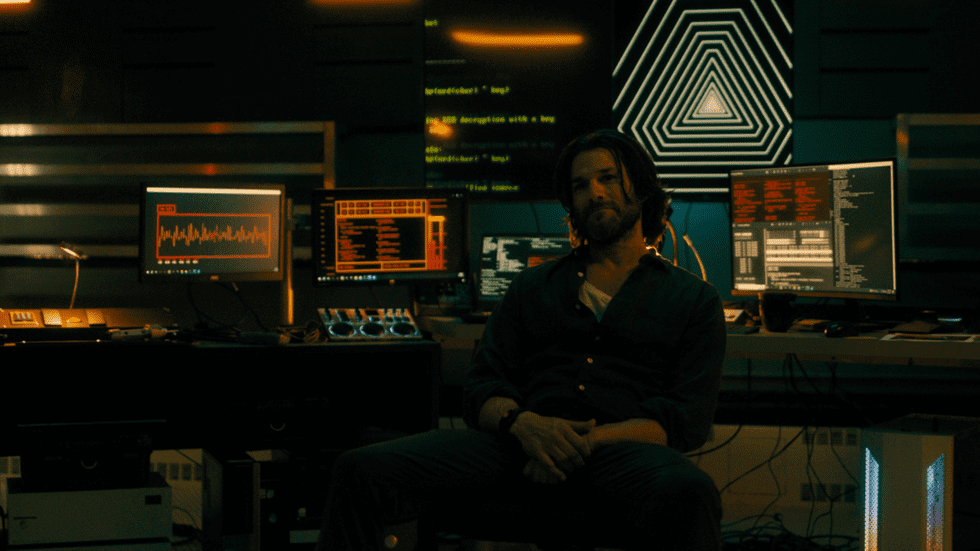“The A-Frame” - Tribeca 2024 Film Review
This review was originally posted on Film Obsessive.
The A-Frame is not your typical cancer movie. While some of the film unfolds at hospitals and support group meetings, there’s also an element of quantum mechanics and multi-dimensional travel at play. The A-Frame is a genre-bending story about loss, the lengths that should be taken in the name of discovery, and how time on this earth is best spent. The movie lays out an odd path, but those who like to live in a world with the likes of David Cronenberg will enjoy the world writer/director Calvin Lee Reeder has created.
Donna (Dana Namerode) is a pianist whose ability to play piano as she knows it will change in the next few days. She has been diagnosed with osteosarcoma in her hand. It’s a type of bone cancer and Donna is considered “lucky” by her doctor because the cancer hasn’t spread. He wants to act quickly and amputate Donna’s hand and part of her forearm. She’s hesitant because of what this will mean for her life and her career as a pianist, so when a strange man named Sam (Johnny Whitworth) offers an alternative to surgery, she’s immediately intrigued. Sam promises that he can use multi-dimensional quantum mechanical theories to cure Donna’s cancer, but it becomes clear that this isn’t the miracle he claims it to be.
Courtesy of Tribeca
The A-Frame is interestingly split between two genres. On the one hand, it’s a deeply human look at a variety of people dealing with their cancer diagnoses. Donna is looking for any possible cure. When the audience first sees her, she’s meeting with a Reiki specialist who gives her an amethyst stone and tells her to hold it in her right hand all day. There’s a desperation that allows her to get to the point where she would readily accept the help of an odd man in a nearly empty warehouse. Linda (LaKeta Caston), the leader of the cancer support group, has made peace with her diagnosis. Rishi (Nik Dodani) takes the pain he feels and makes jokes out of it for his stand-up routine. All of them have the same diagnosis, but try to find peace for themselves.
The other half of The A-Frame is a science-fiction story about the reality of discovery. For every technological advancement, there’s a mastermind behind the scenes who has spent years trying to solve a mystery. Sam discovered this cure by accident through his other quantum mechanical scholarly pursuits. He was initially working with cancer-stricken mice, and Donna is his first foray into human trials. He’s confident in his finding, but you never know what will happen until that first human test. The A-Frame hints at the morality of these leaps and bounds in the medical field. Is being able to cure cancer worth skipping all these steps in order to have the payoff of no more cancer? Some would say yes. Others would be concerned about whether the tests are worth putting lives in jeopardy.
For all its potential to dig into the complex emotions that come with intense medical diagnoses and the forefront of technological advances, The A-Frame shies away from the thorniness. The beauty of genre movies is that they allow for deep explorations of very human emotions. The premise of The A-Frame is strong because the uncertainty of Sam’s multidimensional cancer treatment speaks to the larger feeling humans have about what happens next in the grand scheme of life and death. It’s a step we all take, but even though humanity has existed for as long as it has, we are no closer to understanding what comes next.
Courtesy of Tribeca
Donna is asked not to return to the cancer support group because she encourages the other members to believe in miracles. She sees what Sam did for her as a miracle that has to be passed along to others so they can experience the same thrill of life changing for the better in an instant. The A-Frame allows Donna and Linda to have an honest conversation about the role miracles play in life-and-death situations. It’s this type of conversation that The A-Frame would have benefitted from having more of in order to really take a breath and allow the weight of the characters’ decisions to have the full, emotional impact.
“Quantity has nothing over quality,” Linda tells the members of the support group during a meeting. She’s referring to time on earth. Many in the group have a terminal diagnosis, and it’s a matter of when, not if. But that much can be said for all of us. We’re all a matter of when, so it’s simply a choice of deciding how to spend the amount of time we’re given. The A-Frame is a trippy, multi-dimensional sci-fi flick with its gory heart on its sleeve.
support your local film critic!
~
support your local film critic! ~
Beyond the Cinerama Dome is run by one perpetually tired film critic
and her anxious emotional support chihuahua named Frankie.
Your kind donation means Frankie doesn’t need to get a job…yet.
Follow me on BlueSky, Instagram, Letterboxd, & YouTube. Check out Movies with My Dad, a new podcast recorded on the car ride home from the movies.


